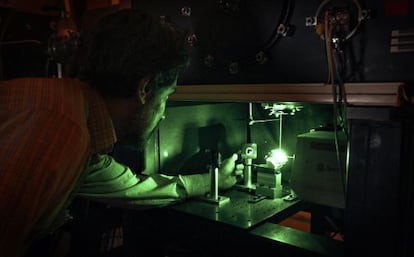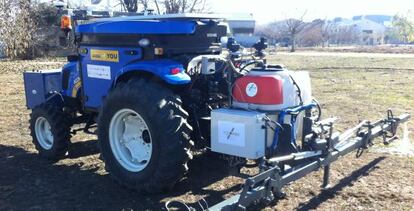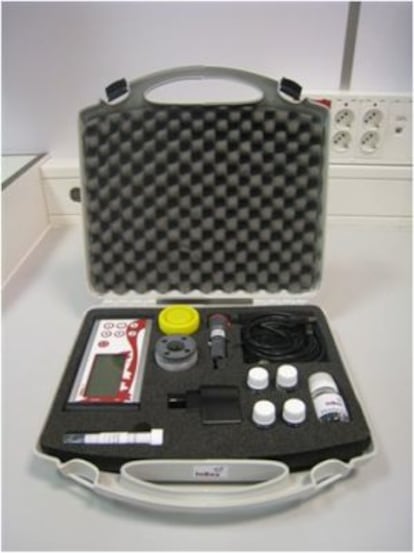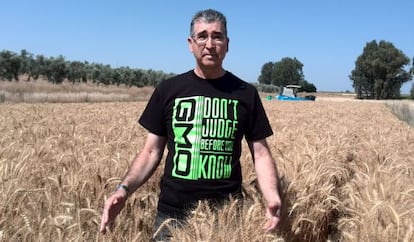Why Spain¡¯s research and development is going nowhere
Universities are coming up with great ideas, but struggle to adapt them to the market

The discovery of penicillin wasn¡¯t enough in itself to change the world: it first had to be made into a medicine, and then distributed to humanity. This leap is one that many breakthroughs and inventions by Spanish scientists working at the country¡¯s universities very often fail to make. Research that could improve lives, such as flour for people with celiac disease, a self-driving tractor, or a kit for analyzing wine and beer, and that have taken years to develop and cost millions of euros, are either never developed, or are taken abroad.
In May 2014, Spain¡¯s state broadcaster reported on a bright blue, self-driving tractor created by a consortium of 14 partners led by the country¡¯s National Research Council (CSIC) that had cost €8 million of EU funds to develop. Guided by maps traced by drones that identified areas in fields where soil quality was poor, the tractor used up to 75 percent less fertilizer and weed killer than traditional methods.

A year later, the project has been abandoned after failing to find funding to further develop prototypes. ¡°Right now we couldn¡¯t set the system up because we don¡¯t have a prototype,¡± says Manuel P¨¦rez Ruiz of the University of Seville. ¡°It hasn¡¯t even been kept for teaching purposes,¡± he adds.
Despite advances in creating specialist organizations in Spain¡¯s universities known as OTRIs, or Transfer of Results and Research Offices, many ideas never get off the drawing board. ¡°A large part of the science carried out in Spain is not transferred because there is no infrastructure,¡± says Rafael Alonso Sol¨ªs, director of the Institute of Biomedical Technologies of the University of La Laguna, in Tenerife. ¡°But things could be about to change,¡± he adds hopefully.
The problem is in identifying models, such as exist in the United Kingdom or the United States, that can be copied. Two US centers: the Massachusetts Institute of Technology (MIT) and the University of California, produce more patents each year than all of Spain¡¯s universities together (488 in 2012, according to IUNE, the body that monitors research in Spanish universities).
A large part of the science carried out in Spain is not transferred because there is no infrastructure¡± Rafael Alonso Sol¨ªs, director of the Institute of Biomedical Technologies of the University of La Laguna, in Tenerife
The list of problems is long according to the COTEC report, produced each year by the Foundation for Technological Innovation, the institute created by a group of Spanish businesses to improve competitiveness. It says the ¡°mismatch between technological supply and the demands of business¡± is a major issue identified by the experts consulted by the publication. It adds bureaucratic issues, the reluctance of Spanish financiers to fund innovation, and that businesses in general fail to take advantage of the state¡¯s R+D system.
The offices set up in Spanish universities to transfer technology don¡¯t work properly, say the experts, blaming civil servants who may have language skills but that lack experience in the business world. The country¡¯s polytechnic universities tend to do better in converting research into something applicable to the real world, they add.
¡°We still lack professionalization, but we¡¯re working on it,¡± admits Rafael Garesse, the Vice Rector of Research and Innovation of Madrid¡¯s Autonomous University OTRI. The office has five workers ¡°who are R+D managers¡±, he explains: people who know what a research project is, the laws covering it, and how to protect data. The problem is that they have no business outlook.
Problems include bureaucratic issues and the reluctance of Spanish financiers to fund innovation
Asked why this is still the case after two decades, Garesse says that until recently, technology transfer was not an objective of Spain¡¯s universities. ¡°The change in direction of EU-funded research is relatively recent.¡± His university¡¯s OTRI has helped set up around a dozen companies over the last decade, around 10 percent of those that started out there. Its team has handled 425 patent requests, of which 176 have been granted.
THE WINE ANALYSER
¡°The market has its rules and we scientists don¡¯t know them.¡± The technology-based company set up by Jos¨¦ Manuel Pingarr¨®n, Professor of Chemical Analysis at Madrid¡¯s Complutense University, has been set back by its most recent attempt to enter the markets. Pingarr¨®n and his team have developed a simple kit for testing wine in the early stages of fermentation. They thought that in a country like Spain, one of Europe¡¯s largest wine producers, that they were on to something. Four people spent eight years on the project, spending some €400,000 of public funding. ¡°We thought we had a great project, but when we presented it to wine producers they said they needed something simpler to use,¡± says Pingarr¨®n. ¡°They told us that it was a machine only scientists could use.¡±

¡°It¡¯s not easy selling something during an economic crisis, and we don¡¯t know how to do it,¡± he adds. ¡°We can¡¯t be part-time entrepreneurs.¡± If he were to repeat the project, he says he would do it differently. His mistakes will at least be learned from by other scientists who contact the OTRI, which is still trying to sell the invention, if nothing else to pay back the €120,000 loan they received. ¡°We owe this money, and with the few kits we have sold, it¡¯s not enough to pay salaries, rents, and to cover the loan.¡± The team is about to close a deal with a brewery to measure that alcohol-free beer really is 0.0%, as well as an agreement with Madrid City Hall to provide police officers with simple-to-use kits that can test what kind of alcohol young people taking part in open-air parties, or botellones, are drinking, and then fine them for breaking municipal rules on boozing in public after certain hours.
BREAD FOR SUFFERERS OF CELIAC DISEASE
Researchers are no entrepreneurs, and businesses, or at least Spanish businesses, tend not to support research, as the team led by Francisco Barro of the Institute of Sustainable Agriculture in the Andalusian city of C¨®rdoba, which is funded by the CSIC, can testify. After a decade¡¯s research, they came up with something that could make life much better for a lot of people: cereals that people with wheat allergies can eat. All that is required are some clinical trials, but the tests carried out so far have shown that people with celiac disease can eat three or four slices of bread made with these cereals without suffering any effects. There is nothing else like it in the world.

The transgenic seeds were patented by the CSIC, which found a company to take care of the commercialization, Plan Biotechnology Limited. ¡°A lot of companies contacted us, but no Spanish businesses. Many farmers also got in touch to ask if they could plant the wheat because the findings had been published everywhere,¡± says Barro.
He believes Spanish companies were wary of getting involved in what he admits is a complex project because they knew that the genetically modified product would require the approval of Brussels. ¡°It is so sad that this will be produced abroad. In the end, as researchers, we want this to be in the marketplace, because it will help improve the quality of life for people with celiac disease. I am sure that that this will bring down the price of many specialist products.¡±
BASIC RESEARCH
Traditional thinking is that university research is a necessary part of basic science. Soledad Sacrist¨¢n discovered by accident a practical use for something she was researching: her basic science ended up being used. ¡°The future product that it may be used for was not the objective in my research,¡± says Sacrist¨¢n, a specialist in plant disease at the Center for Plant Biotechnology and Genomes at the Polytechnic University of Madrid. What she had discovered was a micro-organism that helps plants produce more fruits and seeds, and that can avoid the use of chemical fertilizers.
But she soon ran into difficulties. The first was finding funding for the patent. As a scientific project, her research grant didn¡¯t include money for patenting, which can cost between €6,000 and €10,000 a year. However, a company, Plant Research Biotech, stepped in. Now the long process of development has begun. ¡°The first results were in controlled laboratory conditions,¡± she says. ¡°But now we have to reproduce this in the real world. The product has to be profitable, viable, and able to be used on farms. It is possible that after the tests, we realize that it has no commercial use.¡±
¡°Allowing these discoveries to disappear has almost become the defining characteristic of Spanish research: the ideas and the people go abroad. There is no structure here to make use of R+D. There is very little R, and still less D. Although I understand that serious efforts are being made,¡± says Miguel Pita, a geneticist at Madrid¡¯s Autonomous University. Pita says that while he supports practical research, he also says it can become an end in itself. ¡°When the love affair between research and business flourishes, which I don¡¯t necessarily know will happen, I am a little afraid that we will leave behind basic research. History has shown that the great advances in science, as with the human genome project, happened when we didn¡¯t know what it could be used for.¡±
Tu suscripci¨®n se est¨¢ usando en otro dispositivo
?Quieres a?adir otro usuario a tu suscripci¨®n?
Si contin¨²as leyendo en este dispositivo, no se podr¨¢ leer en el otro.
FlechaTu suscripci¨®n se est¨¢ usando en otro dispositivo y solo puedes acceder a EL PA?S desde un dispositivo a la vez.
Si quieres compartir tu cuenta, cambia tu suscripci¨®n a la modalidad Premium, as¨ª podr¨¢s a?adir otro usuario. Cada uno acceder¨¢ con su propia cuenta de email, lo que os permitir¨¢ personalizar vuestra experiencia en EL PA?S.
?Tienes una suscripci¨®n de empresa? Accede aqu¨ª para contratar m¨¢s cuentas.
En el caso de no saber qui¨¦n est¨¢ usando tu cuenta, te recomendamos cambiar tu contrase?a aqu¨ª.
Si decides continuar compartiendo tu cuenta, este mensaje se mostrar¨¢ en tu dispositivo y en el de la otra persona que est¨¢ usando tu cuenta de forma indefinida, afectando a tu experiencia de lectura. Puedes consultar aqu¨ª los t¨¦rminos y condiciones de la suscripci¨®n digital.








































